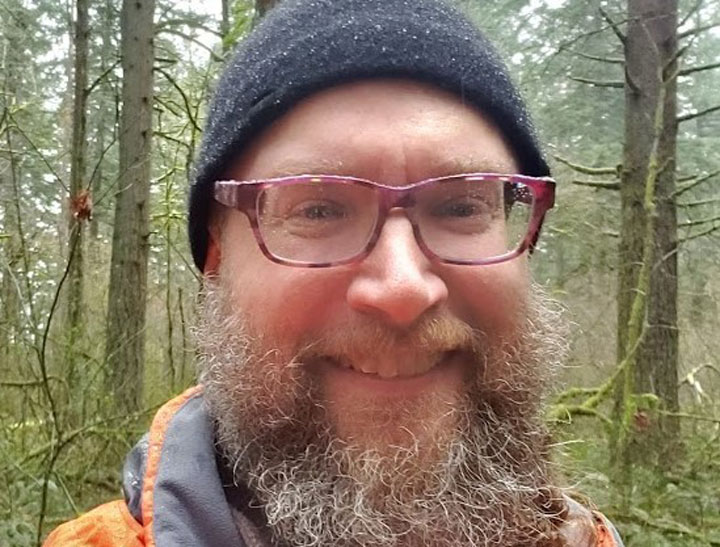
The life’s work of Matt Guynn ’95 took root long ago.
 Son of Martha Waas ’71, and grandson of Professor Emeritus David ’47 and Becky Brightbill Waas ‘46c, Guynn grew up in Brethren congregations and a family committed to peace and justice and solidarity with people around the world. “I really got that formation as a young person in a Church of the Brethren discipleship class and in the bosom of my family.”
Son of Martha Waas ’71, and grandson of Professor Emeritus David ’47 and Becky Brightbill Waas ‘46c, Guynn grew up in Brethren congregations and a family committed to peace and justice and solidarity with people around the world. “I really got that formation as a young person in a Church of the Brethren discipleship class and in the bosom of my family.”
Now, Guynn lives out those values as director of organizing for church and community groups for On Earth Peace (OEP), an agency of the Church of the Brethren dedicated to helping others use active nonviolence to respond to conflict, injustice and violence.
His work could not be timelier.
As part of the Kingian Nonviolence Coordinating Committee, Guynn joined a lineage and legacy of elders who were co-workers with Rev. Dr. Martin Luther King Jr. Through OEP, he now trains others in Dr. King’s nonviolence philosophy, helping them build capacity for nonviolence and develop projects to challenge violence and build justice.
“Nonviolence is developing the will and the skill to do something about the deeper issues and to galvanize an entire community around a hopeful and positive vision of the future,” explains Guynn. “I think people are looking for that.”
One of Guynn’s roles is working with churches or clusters of churches to help them tackle a specific issue, such as organizing for racial justice or building leadership and commitment to racial justice in their congregations.
“Polarization has been increasing in our country,” says Guynn. “Conflicts and differences that were often hidden from view are now in more plain sight.” With the emergence of the Black Lives Matter movement, social media and smartphones have made it possible for more people to see what communities of color have been experiencing. “It’s not that it’s gotten worse in the past five years, it’s just gotten more visible to people who weren’t living it before.”
Guynn adds, “There’s a hunger right now to work for justice, to not let the things that have come into the light to go back into hiding.” People are more willing to “take responsibility for the problems in our communities and figure out what to do that builds on the kinds of charity and social service work that many people are accustomed to, with a deeper addressing of root issues.”
Guynn grew up in Indianapolis. As a peace studies major at Manchester, he recalls studying international politics with Professor Benson Onyeji, learning how political systems relate to gender, class and race. He also traveled with Professor Ken Brown to the Martin Luther King Center in Cuba, an experience that inspired him to write his honors thesis on Cesar Chavez and nonviolence organizing.
As a 19-year-old college student, Guynn had a summer internship with On Earth Peace, based in New Windsor, Md. While there, he received training at Training for Change, a Philadelphia-based international training center for social change. He calls the training “a watershed moment in my life” and he remains active with the organization.
After Manchester, Guynn earned his master’s degree in international peace studies from the University of Notre Dame and a master’s in theology from Bethany Theological Seminary before returning full time to OEP.
Through the years, a number of Manchester students have participated in OEP’s robust paid internship program. Some interns work for OEP in administrative roles such as social media, development and communications. Others are organizers, working on issues including racial justice, LGBTQ+ justice, environmental justice, gender justice, Palestine and immigration. Still others help plan nonviolence training sessions and meet with people who are interested in projects in their communities.
Interns, explains Guynn, are “a very vital, essential part of our organization. Our interns do not just look over the shoulder of somebody who’s doing important work. They do the work.”
Through both the intern program and its outreach, OEP helps young people develop a lifelong commitment and capacity to working for peace and justice.
Though all OEP work is virtual during the pandemic, the organization has been partially remote for a long time. There is one staff member in New Windsor, while others like Guynn, who lives in Portland, Ore., are spread across the country.
Before COVID-19, Guynn would do some work virtually and some in person, such as visiting a church, preaching and leading a workshop.
Wherever Guynn is, Manchester is with him, too. “It really impacted the development of my life. The experiences I had at Manchester are woven into who I am and what I do in the world. I already had values formation before I arrived, but Manchester helped me start building the skills to live out my values.”
By
Melinda Lantz ’81